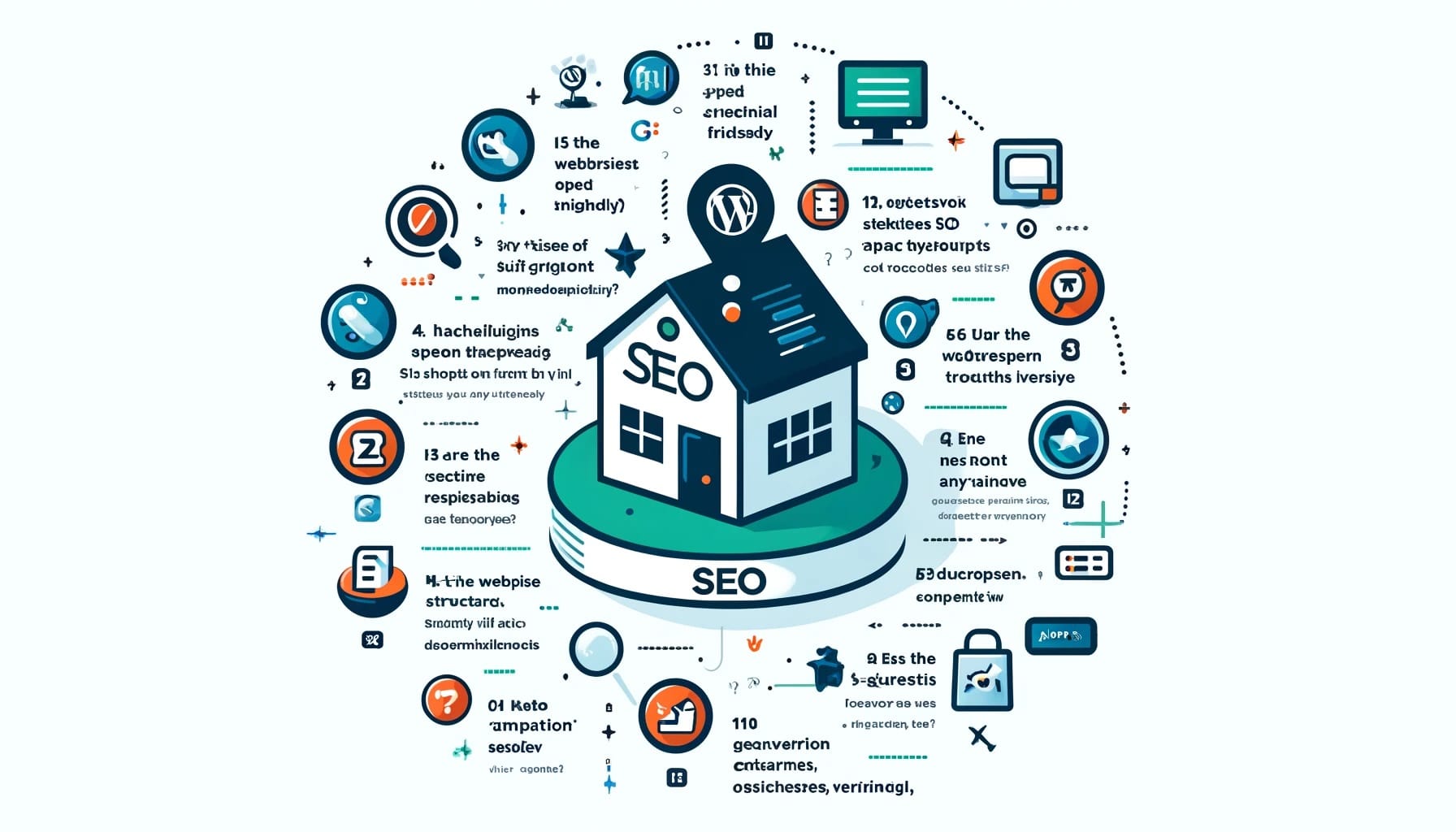Conducting a Successful WordPress SEO Audit
Conducting a successful WordPress SEO audit is critical to the growth and sustainability of any online business, particularly for SMEs. The right audit will help you identify chances to improve your website’s exposure, usability, and relevance. Here, we look at essential questions every SME owner should ask to ensure their WordPress SEO audit is thorough and effective.
What is the Purpose of Your WordPress SEO Audit?

Before getting into the details, define the aim of your audit. Are you wanting to boost organic traffic, improve site speed, or improve the user experience? Understanding your goals will direct the emphasis of your audit, ensuring that your efforts are in line with your business objectives. A defined purpose aids in task prioritization and efficient resource allocation.
Is Your Website Technically Sound?
Technical SEO is the foundation of any successful audit. Begin by checking the basics:
- Site Speed: Does your website load quickly? Tools such as Google PageSpeed Insights can provide useful information and suggestions.
- Mobile-Friendliness: Has your website been optimized for mobile devices? With mobile traffic outpacing desktop, this is critical for both user experience and SEO.
- Indexability: Can search engines crawl and index your website efficiently? Check for blocked resources and update your sitemap.
How Well is Your Content Optimized?
SEO relies heavily on content. Examine your current material for quality and relevance:
- Keyword Usage: Are you targeting the correct keywords? Use tools like Ahrefs or SEMrush to discover keywords that your target audience is searching for.
- Structure: Is your material well-structured, with clear headings and subheadings? This not only increases readability but also aids search engines in comprehending your material.
- Uniqueness: Is your content original and valuable? Avoid duplicating content, which might harm your SEO efforts.
Are Your On-Page Elements Optimized?
On-page SEO is critical to increasing your website’s visibility. Focus on the following elements:
- Title Tags and Meta Descriptions: Are they engaging and keyword-rich? Ensure that they appropriately represent the information of each page.
- Header Tags: Do you use header tags (H1, H2, and H3) correctly? They should be used to organize your information hierarchically.
- Internal Linking: Do you properly employ internal links to direct users and search engines? This helps to disperse page authority and increase crawlability.
How Effective is Your Off-Page SEO?
Off-page SEO, including backlinks, has a big impact on your website’s authority and ranking:
- Backlink Profile: Do you have a good backlink profile? Use tools like Moz or Ahrefs to examine your backlinks and remove any poisonous connections.
- Social Signals: Are you active on social media? Social involvement can increase visitors and improve your online visibility.
Using Local SEO?
Local SEO is essential for SMEs, particularly those with a physical presence:
- Google My Business: Has your profile been claimed and optimized? Ensure that your business information is correct and up to date.
- Local Citations: Is your company information consistent throughout local directories? Consistency helps to create trust and improve local rankings.
How User-Friendly Is Your Site?
User experience (UX) has a huge impact on SEO. Consider the following aspects:
- Navigation: Is your website easy to navigate? A simple and logical navigation layout allows consumers to find information quickly.
- User Engagement: Do users interact with your content? High bounce rates can indicate a poor user experience and lower your rankings.
Do You Monitor and Analyze Your Performance?
Regular monitoring and analysis are essential for continual improvement:
- Analytics Tools: Do you use Google Analytics and Google Search Console? These tools provide essential information about your website’s performance.
- KPIs: Have you established key performance indicators (KPIs) for measuring success? Monitor data such as organic traffic, bounce rate, and conversion rate.
Are You Keeping Up with SEO Trends?
SEO is continuously evolving. Staying up to date with the newest trends and algorithm modifications is essential:
- Algorithm Updates: Are you aware of any recent Google algorithm updates? Keeping up with updates guarantees that your strategies are effective.
- Industry News and Insights: Are you following industry news and insights? Blogs, forums, and SEO communities can all be valuable sources of information.
How Do You Optimize Your WordPress Website for Core Web Vitals?
Core Web Vitals have emerged as an important ranking criteria for Google, stressing the importance of page experience. These measures are: Largest Contentful Paint (LCP), First Input Delay (FID), and Cumulative Layout Shift (CLS). Optimizing these aspects is critical to both user enjoyment and SEO effectiveness.
To improve LCP, make sure your server responds quickly, maybe by using a Content Delivery Network (CDN) and optimizing your images and videos for faster loading. Compressing and properly sizing photos can significantly increase LCP. For FID, prioritize lowering JavaScript execution time. Defer non-essential scripts and eliminate any superfluous JavaScript. Implementing code splitting can also assist manage load times more effectively. CLS can be solved by reserving space for ad slots and photos, which will minimize sudden layout alterations and improve your site’s visual stability.
Are Your Plugins and Themes SEO Friendly?
Plugins and themes are essential to WordPress functionality and aesthetics, but they can have an influence on SEO. It is critical to select SEO-friendly themes that are responsive, fast loading, and coded using best practices. Themes should work with popular SEO plugins like Yoast SEO and All in One SEO Pack, which can handle meta tags, sitemaps, and other important SEO features.
Plugins can dramatically increase the functionality of your site, but employing too many will slow it down. Prioritize plugins that address specific SEO needs, such as caching plugins (e.g., WP Super Cache, W3 Total Cache) for faster site loading and schema markup plugins for better search exposure with rich snippets. Regularly update your plugins and themes to ensure they are secure and performance-optimized.
How Effective Is Your Schema Markup Implementation?
Schema markup helps search engines understand the context of your content, resulting in improved SERP features such as rich snippets, which can increase click-through rates. Implementing schema markup entails adding structured data to your website’s code, which may appear onerous but is made easier by several WordPress plugins.
Plugins such as Schema Pro and WP SEO Structured Data Schema can help automate the process, ensuring that your pages are properly marked up for reviews, recipes, events, and other rich results. To guarantee that your structured data is error-free, use tools such as Google’s Structured Data Testing Tool. Proper schema markup not only improves SEO, but it also increases user engagement by producing more informative and visually appealing search results.
Use of Advanced SEO Analytics and Reporting?
Monitoring your SEO performance extends beyond the simple Google Analytics. Advanced SEO analytics tools provide more information about your traffic sources, user activity, and conversion rates. Tools such as SEMrush, Ahrefs, and Moz provide complete analytics and reporting capabilities, allowing you to examine keyword ranks, backlink profiles, and competition benchmarking.
Implementing these techniques allows you to determine which strategies are effective and where there is opportunity for improvement. Setting up bespoke dashboards can provide real-time data on key SEO parameters, allowing you to make more educated decisions. Regularly examining these statistics allows you to tailor your SEO techniques to changing trends and algorithms, assuring long-term growth and visibility.
How Can You Use AI and Machine Learning in Your SEO Strategy?
AI and machine learning are transforming the SEO environment. AI-powered tools can automate tedious operations, give predictive analytics, and provide more detailed insights into user intent and behavior. Integrating AI-driven SEO technologies into WordPress websites can provide you a competitive advantage.
For example, AI systems such as BrightEdge and MarketMuse examine massive datasets to discover content gaps, optimize content for specific keywords, and forecast how changes would effect rankings. These technologies can also assist you generate content ideas depending on user intent, ensuring that your material remains relevant and valuable. Using AI, you can improve your SEO approach with precision and efficiency, keeping up with the ever-changing digital world.
Are You Using Effective Link-Building Strategies?
Link building remains an essential component of SEO, but it must be approached with a plan that prioritizes quality over quantity. Building a strong backlink profile entails obtaining links from authoritative, relevant websites. Guest writing on high-authority websites, generating shareable infographics, and utilizing social media platforms can all help you get quality backlinks.
Make your material link-worthy by providing unique ideas, original research, or complete guidelines that other websites will want to use. Building ties with influencers and industry leaders can lead to useful backlinks. Tools like Ahrefs and Majestic may help you monitor your backlink profile and uncover link development opportunities, ensuring that your plan is effective and sustainable.
How Can Content Marketing Help Boost SEO?
Content marketing is essential for SEO, with high-quality content driving organic traffic and engagement. Developing a content strategy that coincides with your SEO goals entails knowing your audience’s needs and developing content to meet those demands. Regularly posting blog pieces, case studies, whitepapers, and videos can help you position yourself as an authority in your field.
Interactive content such as quizzes, polls, and webinars can help increase user engagement and dwell time, which are good signals for search engines. Repurposing content for various formats and platforms broadens its reach and impact. For example, a blog post can be turned into a video, infographic, or podcast episode, increasing its visibility and interaction.
Top SEO Experts’ Perspectives on WordPress SEO Audits, Services, and Consulting
Understanding the complexities of WordPress SEO from industry gurus can be quite advantageous for a small business owner. We’ve gathered expert perspectives from top SEO professionals, including Eugen Platon, founder of onwardSEO, to provide meaningful insights on WordPress SEO audits, services, and advice.
What are the Essential Components of a Successful WordPress SEO Audit?

According to Eugen Platon, Founder of onwardSEO, a good WordPress SEO audit requires a thorough technical inspection. This involves assessing the site’s performance, mobile responsiveness, and crawlability. An in-depth content audit is also necessary to ensure that all content is optimized for target keywords and user intent. Finally, assessing the backlink profile to uncover chances for high-quality link acquisition will greatly help your SEO efforts.

Neil Patel, Co-Founder of Neil Patel Digital, emphasizes a focus on user experience. Google’s algorithms are progressively favoring websites that provide a seamless, intuitive experience. Your SEO audit should therefore involve a thorough examination of user metrics such as bounce rate, time on page, and conversion paths.

SparkToro founder, Rand Fishkin, emphasizes the importance of high-quality content. During an audit, assess your content’s relevance, engagement, and uniqueness. Ensure that your content outperforms your competition in answering your target audience’s questions.
How Do WordPress SEO Services Benefit Small and Medium-Sized Businesses?
According to Brian Dean, founder of Backlinko, WordPress SEO services help small and medium-sized businesses manage challenging SEO challenges. From keyword research to technological adjustments, these services ensure that your website is optimized for both search engines and consumers.
Aleyda Solis, Founder of Orainti, emphasizes the importance of SEO services for WordPress for continuing improvement. They provide ongoing monitoring and modifications to keep up with algorithm updates and changing market dynamics, assuring consistent visibility and traffic increase.
According to Barry Schwartz, Editor of Search Engine Roundtable, specialized WordPress SEO services offer knowledge and resources that small and medium-sized enterprises sometimes lack. This includes comprehensive analytics, competitive analysis, and customized plans based on your company’s specific needs.
What Qualities Should SMEs Look for in a WordPress SEO Consultant?
Eugen Platon, Founder of onwardSEO, recommends hiring a WordPress SEO expert with a track record of success in similar organizations. Look for experts who can provide unique solutions, accurate reporting, and a clear understanding of your business objectives.
Zyppy’s founder, Cyrus Shepard, emphasizes the importance of communication. Your expert should be able to explain SEO topics in terms that you can comprehend and use. They should provide regular updates and respond to your inquiries and concerns.
Marie Haynes, founder of Marie Haynes Consulting, recommends hiring a consultant who prioritizes ethical SEO tactics. With Google’s increased emphasis on E-E-A-T (Experience, Expertise, Authority, and Trustworthiness), it’s critical that your SEO efforts follow these guidelines to avoid penalties and ensure long-term success.
Matthew Woodward, SEO Expert and Blogger, emphasizes the importance of understanding WordPress-specific SEO difficulties. Consultants should have a thorough understanding of WordPress plugins, theme optimization, and technical SEO features specific to WordPress sites.
Conclusion
Gaining insights from leading SEO experts can be quite beneficial for SME owners trying to optimize their WordPress websites. Whether you’re doing a comprehensive SEO audit, working with an SEO agency, or looking for advisory services, these professional comments emphasize the most important factors to consider. By incorporating their recommendations, you can ensure that your WordPress site is properly optimized for both search engines and people, paving the path for long-term online success.
About the Author:
With over 14 years of seasoned expertise in Technical SEO consulting, Eugen Platon SEO Expert stands at the forefront of the evolving digital marketing landscape. His approach to Technical SEO (search engine optimization) is both comprehensive and bespoke, ensuring that each technical SEO project he undertakes is finely tuned to its unique requirements and goals. He excels in elevating website visibility, bolstering user engagement, and navigating the ever-changing currents of SEO. Under his guidance, your online presence is transformed into a dynamic digital force, adeptly meeting and surpassing set objectives. Eugen combines time-tested SEO strategies with cutting-edge AI powered SEO techniques, dedicating himself to transforming your digital footprint into a magnet for both search engines and your target audience. Embark on a journey with him to unlock the full SEO potential of your online presence.


